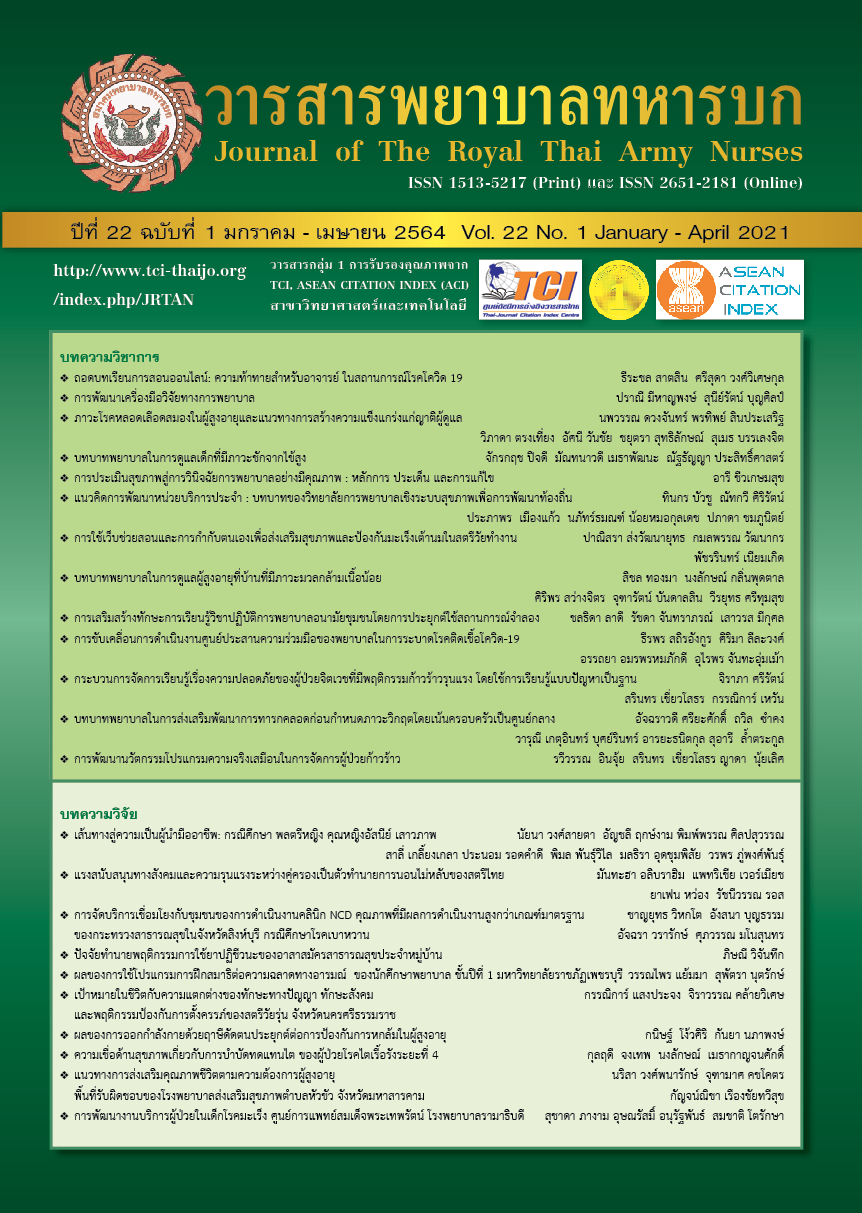A Pilot Study of a Self-Management Support Intervention in Middle-Aged Women with Knee Osteoarthritis
Keywords:
self-management support, middle-aged women, knee osteoarthritis, health related quality of lifeAbstract
This pilot study of one-group pre-experimental design with pretest-posttest and follow-up measures aimed to test feasibility of a self-management support intervention comparing 3-time measuring scores of knee functional status and health related quality of life (HRQOL) among middle-aged women with knee osteoarthritis. A convenience sampling technique was used to recruit participants including five middle-aged women who have been clinically diagnosed with knee OA in Nakhon Si Thammarat province. Participants received a self-management support intervention of all 8 sessions for 4 weeks, and 4-week follow-up. Data were analyzed by using Friedman with Dunn-Bonferroni post hoc test.
The results revealed that there are significant differences over the three-time measures of the outcomes. Scores of Knee functional status and HRQOL at follow-up period (T3) was significantly greater than that at baseline (T1) (p<.05) while no difference was found between posttest (T1) and baseline (T2), and posttest (T2) and follow-up (T3) measurement. These findings indicate this self-management support intervention is feasible in nursing clinical practice for further implementation.
Downloads
References
Lane NE, Shidara K, Wise BL. Osteoarthritis year in review 2016: Clinical. Osteoarthritis and Cartilage. 2017; 25(2): 209-215.
Wang Y, Lombard C, Hussain SM, Harrison C, Kozica S, Brady SR, at al. Effect of a low-intensity, self-management lifestyle intervention on knee pain in communitybased young to middle-aged rural women: A cluster randomized controlled trial. Arthritis Research & Therapy. 2018; 20(1): 74. 1-9.
Louthrenoo W, Jatuworapruk K, Lhakum P, Pattamapaspong N. Performance of the 2015 American College of Rheumatology/European league against rheumatism gout classification criteria in Thai patients. Rheumatology International. 2017; 37(5): 705-711.
Tantapong U, Nimit-arnun N, Roojanavech S. The Selected Factors Affecting to Health-Preventive Behaviors of Primary Knee Osteoarthritis among Teachers in Nakhon Pathom Province. J Royal Thai Army Nurses. 2019; 20(2): 316-326. (in Thai).
Riddle DL, Makowski M, Kong X. Knee osteoarthritis worsening across the disease spectrum and future knee pain, symptoms, and functioning: A multisite prospective cohort study. Arthritis care & research. 2015; 67(12):1722-1729.
Nimit-arnun N. The epidemiological situation and risk assessment of knee osteoarthritis among Thai people. Journal of The Royal Thai Army Nurses 2014; 15(3): 185–194. (in Thai).
Palazzo C, Klinger E, Dorner V, Kadri A, Thierry O, Boumenir Y, Martin W, Poiraudeau S, Ville I. Barriers to home-based exercise program adherence with chronic low back pain: Patient expectations regarding new technologies. Annals of physical and rehabilitation medicine. 2016; 59(2):107-113.
Umapathy H, Bennell K, Dickson C, Dobson F, Fransen M, Jones G, at al. The web-based osteoarthritis management resource my joint pain improves quality of care: A quasi-experimental study. J Med Internet Res. 2015; 17(7): 1-13.
Ryan P, Sawin KJ. The individual and family self-management theory: Background and perspectives on context, process, and outcomes. Nursing Outlook. 2009; 57(4): 217-225.
Vitaloni M, Botto-van Bemden A, Contreras RM, Scotton D, Bibas M, Quintero M, Monfort J, Carné X, de Abajo F, Oswald E, Cabot MR. Global management of patients with knee osteoarthritis begins with quality of life assessment: A systematic review. BMC Musculoskeletal Disorders. 2019; 20(1): 493.
Brandt KD. Osteoarthritis diagnosis: Avoiding the pitfalls. J Musculoskelet Med. 2010; 27(11): 445-451.
Kuptniratsaikul V, Rattanachaiyanont M. Validation of a modified Thai version of the Western Ontario and Mc Master (WOMAC) osteoarthritis index for knee osteoarthritis. Clinical Rheumatology. 2007; 26(10): 1641-1645.
Leurmarnkul W, Meetam P. Properties testing of the retranslated SF-36 (Thai version). Thai J Pharm Sci. 2005;29(1-2):69-88.
Darlow B, Brown M, Thompson B, Hudson B, Grainger R, McKinlay E, Abbott JH. Living with osteoarthritis is a balancing act: An exploration of patients’ beliefs about knee pain. BMC Rheumatology. 2018; 2(1): 1-9.
Sanee A. Self-Management Program in Chronic Diseases. J Royal Thai Army Nurses. 2020; 15(2): 129-134. (in Thai).
Wang Y, Lombard C, Hussain SM, Harrison C, Kozica S, Brady SR, Teede H, Cicuttini FM. Effect of a low-intensity, self-management lifestyle intervention on knee pain in community-based young to middle-aged rural women: A cluster randomized controlled trial. Arthritis Research & Therapy. 2018; 20(1): 1-9.
Wu S.F.V., Kao M.J., Wu M.P., et al. Effects of an osteoarthritis self-management programme. J Adv Nurs. 2011; 67: 1491-1501.
Marconcin P, Espanha M, Yázigi F, Campos P. The PLE 2 NO self-management and exercise program for knee osteoarthritis: Study Protocol for a Randomized Controlled Trial. BMC Musculoskeletal Disorders. 2016; 17(1): 1-12.
Vitaloni M, Botto-van Bemden A, Contreras RM, Scotton D, Bibas M, Quintero M, Monfort J, Carné X, de Abajo F, Oswald E, Cabot MR. Global management of patients with knee osteoarthritis begins with quality of life assessment: A systematic review. BMC Musculoskeletal Disorders. 2019; 20(1): 1-12.
Coleman S, Briffa NK, Carroll G, Inderjeeth C, Cook N, McQuade J. A randomized controlled trial of a self-management education program for osteoarthritis of the knee delivered by health care professionals. Arthritis Research & Therapy. 2012; 14(1): 1-14.
Thorstensson CA, Garellick G, Rystedt H, Dahlberg LE. Better management of patients with osteoarthritis: Development and nationwide implementation of an evidence-based supported osteoarthritis self-management programme. Musculoskeletal Care. 2015; 13(2): 67-75.
Downloads
Published
How to Cite
Issue
Section
License
บทความหรือข้อคิดเห็นใดใดที่ปรากฏในวารสารพยาบาลทหารบกเป็นวรรณกรรมของผู้เขียน ซึ่งบรรณาธิการหรือสมาคมพยาบาลทหารบก ไม่จำเป็นต้องเห็นด้วย
บทความที่ได้รับการตีพิมพ์เป็นลิขสิทธิ์ของวารสารพยาบาลทหารบก
The ideas and opinions expressed in the Journal of The Royal Thai Army Nurses are those of the authors and not necessarily those
of the editor or Royal Thai Army Nurses Association.






